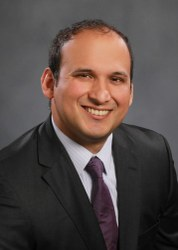 Godwin Yung interviews Debashis Ghosh before he receives the Myrto award and presents a lecture on Thursday, Sep 24 from 4-5pm in Kresge G2.
Godwin Yung interviews Debashis Ghosh before he receives the Myrto award and presents a lecture on Thursday, Sep 24 from 4-5pm in Kresge G2.
Dr. Ghosh still has a few meetings available during the day before his talk. Click here to schedule a time.
Where are you from?
I was born in Kolkata, India but grew up in Iowa and Florida.
Where are you now and what is your official job title?
I am currently Professor and Chair of the Biostatistics and Informatics Department in the Colorado School of Public Health (ColoradoSPH) at the University of Colorado Anschutz Medical Campus.
What are your main research interests?
I have worked on a variety of statistical methods and problems that are mainly motivated by the collaborative endeavors I have worked on. They are mostly in cancer but more recently I am working with researchers in psychiatry and neuroscience on modelling brain behavior. In terms of statistics, my dissertation research was on survival analysis, but I have worked on problems in meta-analysis, multiple comparisons, classification and clustering methods. More recently, I have worked on combining diverse types of high-throughput omics data, and a volume I co-edited on the topic is coming out from Cambridge University Press.
Congratulations on being named the 2015 Myrto Lefkopoulou Distinguished Lecturer. At the presentation, you’ll be giving a talk “Kernel Machines: Back to the future”. Can you summarize for us in two to three sentences what your talk will be about?
Thanks. I will be talking about a class of methods called kernel machines that has been developed extensively in the statistical literature. They have been popular in the machine learning community, but the math underlying them dates back to the early 20th century. I will discuss some of these results and how they can affect current statistical methodology.
How did you become interested in biostatistics?
After my freshman year of college, I interned at the office of the Pediatric Oncology Group in Gainesville, Florida. This was a group of four statisticians and several data managers that conducted clinical trials in childhood cancer. Seeing how these quantitatively trained individuals could work in a team setting to advance medicine and improve the quality of life of these kids was very inspiring.
What do you enjoy most about your job?
Working with students! They are the future of our profession. Seeing them have “light bulb” moments, and I am constantly impressed to see the progress they have made during their careers. I just went to JSM and saw a session organized by one of my former students that featured two other students. It made me very happy to see them.
What do you enjoy outside of work?
Running, reading, spending time with my wife and two daughters, and going on hikes in the mountains.



